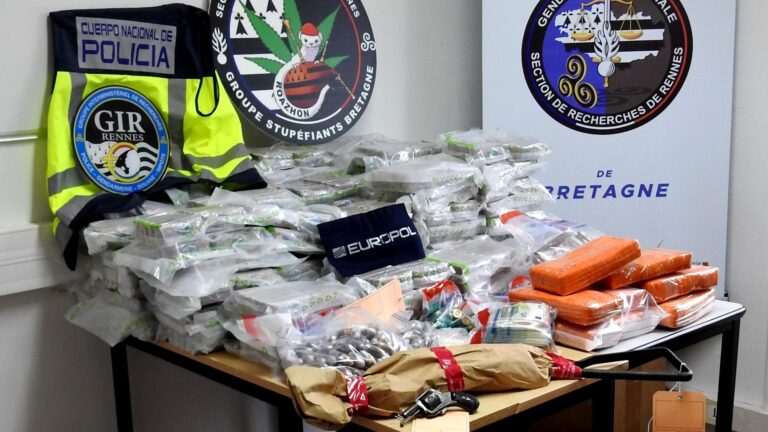France has taken a significant step in its ongoing battle against drug-related crime with the adoption of a new bill aimed at strengthening law enforcement and expanding preventive measures. The legislation, recently passed by the French parliament, introduces a range of policies designed to disrupt drug trafficking networks and support communities affected by the narcotics trade. This move reflects the government’s commitment to tackling a complex issue that has long challenged public safety and social stability across the country.
France enacts comprehensive legislation targeting drug trafficking networks
The French government has taken decisive steps to dismantle drug trafficking networks through a newly passed law that strengthens enforcement and enhances cooperation among law enforcement agencies. This ambitious legislation introduces harsher penalties for drug trafficking crimes, including extended prison sentences and higher fines. Authorities are also empowered to conduct more comprehensive surveillance and asset seizures, aiming to disrupt the financial infrastructure supporting these criminal organizations.
Key provisions of the bill include:
- Enhanced cross-border collaboration between European police forces.
- Increased resources allocated to specialized drug enforcement units.
- Mandatory rehabilitation programs for convicted low-level offenders.
- Expanded use of digital forensics to track narcotics distribution networks.
| Measure | Impact | Implementation Date |
|---|---|---|
| Asset Freeze & Forfeiture | Financial disruption of cartels | Immediate |
| Surveillance Expansion | Improved intelligence gathering | Within 6 months |
| Cross-border Task Forces | International coordination | 1 year |
Enhanced law enforcement strategies aim to disrupt supply chains and distribution
Authorities are implementing a multi-pronged approach designed to effectively sever the lifelines of illicit drug operations. By targeting every stage of the supply chain—from production hubs to urban distribution networks—law enforcement aims to dismantle entrenched criminal enterprises. New technological tools including advanced surveillance systems, AI-driven data analytics, and cross-border intelligence sharing are now central pillars in this intensified crackdown.
Key priorities in this initiative include:
- Disrupting raw material sourcing through increased inspections at ports and border checkpoints.
- Enhancing collaboration between local police, national agencies, and international partners.
- Deploying undercover operations to infiltrate distribution rings.
- Leveraging real-time data to predict and intercept shipments efficiently.
| Strategy | Objective | Expected Impact |
|---|---|---|
| Border Surveillance | Prevent entry of precursor chemicals | Reduced manufacturing capacity |
| Data Analytics | Identify trafficking patterns | Faster interdiction times |
| Cross-Agency Taskforces | Coordinated raids and arrests | Operational disruption |
Focus on prevention and rehabilitation to reduce drug-related harm in communities
Authorities are prioritizing preventive measures and comprehensive rehabilitation programs as essential components of the new legislation. By investing in awareness campaigns and early intervention strategies, the government aims to curb drug misuse before it escalates into more serious criminal activities. These initiatives will focus on vulnerable populations, including youth and marginalized groups, to foster healthier lifestyles and create supportive environments that deter substance abuse.
Rehabilitation efforts are being expanded with increased funding for treatment centers and community-based support services. The approach emphasizes a holistic recovery process that integrates medical care, psychological counseling, and social reintegration. Key areas of focus include:
- Access to evidence-based therapies
- Employment and educational support post-rehabilitation
- Family involvement programs
- Reduction of stigma surrounding addiction
This multi-faceted strategy underscores the belief that combating drug-related harm requires more than legal enforcement. By reducing dependency and promoting recovery, the new law aspires to generate lasting positive impacts across communities.
Government proposes increased funding for public awareness and support programs
In a bold step to address the root causes of drug-related crime, the government has allocated significant resources towards educating the public and bolstering support networks for those affected by substance abuse. This initiative focuses on expanding outreach programs, enhancing accessibility to rehabilitation services, and increasing educational campaigns aimed at prevention in vulnerable communities. Experts believe these measures could foster a more informed society, ultimately reducing the demand that fuels illegal drug markets.
The funding will be directed towards:
- Community workshops: Interactive sessions to educate about the dangers of drug use and available help.
- 24/7 support hotlines: Immediate assistance and counseling services for those in need.
- School programs: Curriculum integration focused on drug awareness and resilience-building.
- Partnerships with NGOs: Collaborations with non-governmental organizations to enhance outreach and rehabilitation efforts.
| Program Element | Allocated Budget (€ millions) | Expected Reach |
|---|---|---|
| Community Workshops | 12 | 50,000+ participants |
| Support Hotlines | 7 | 24/7 national coverage |
| School-Based Programs | 15 | 200,000+ students |
| NGO Partnerships | 10 | Nationwide network |
In Retrospect
The adoption of France’s new bill marks a significant step in the country’s ongoing efforts to tackle drug-related crime. With stricter measures and enhanced law enforcement powers, authorities aim to curb the influence of drug trafficking networks and improve public safety. As the bill comes into effect, its implementation and impact will be closely monitored by both government officials and civil society, underscoring the complexities of addressing this persistent issue in France.




